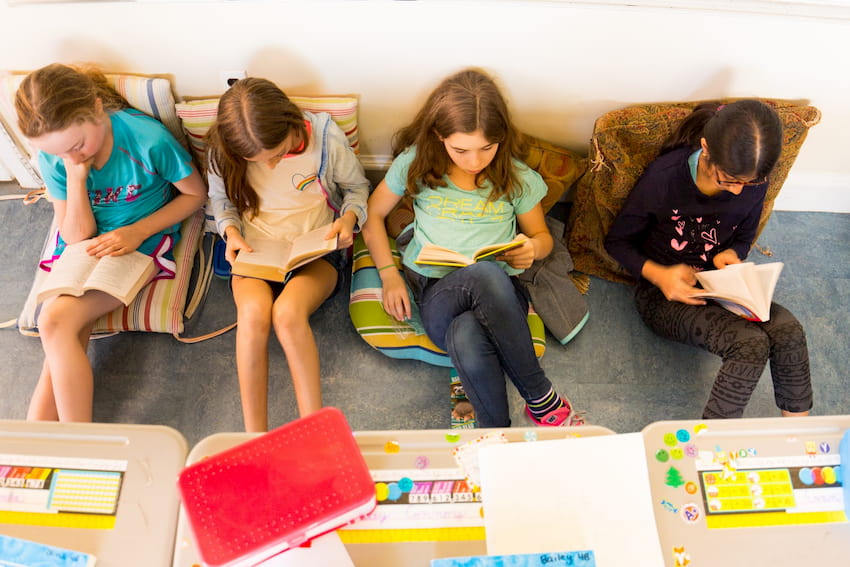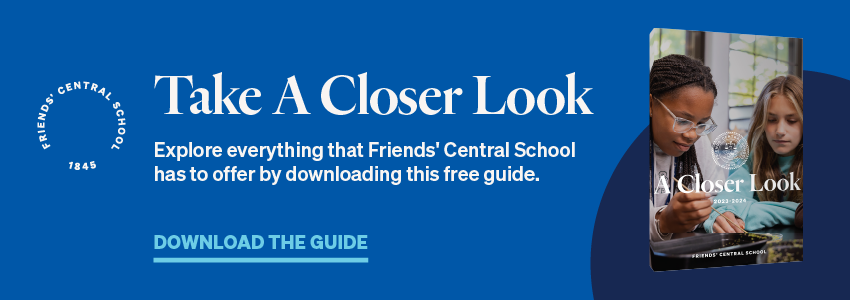
Some students who attend Catholic school have an 'aha' moment when they realize that they want to make a change.
As one of those students, maybe the school you currently attend only goes up through the eighth grade, requiring you to make a decision about the kind of high school that is right for you. Maybe your current school continues through the twelfth grade, but you want to experience something new. Whatever the case, you’ve decided to begin looking at other possibilities for your education.
Free Downloadable Guide: Take a Closer Look At Friends' Central
One alternative to a Catholic school education is attending an independent or private high school. Here, we explore the most common similarities and differences between Catholic and independent schools so that you can make a more informed decision about which one is right for you.
Key Differences Between Catholic and Independent High Schools
Generally speaking, Catholic and independent schools share many similarities. Both tend to offer smaller class sizes; both have added freedom in developing a curriculum for the student body; and both will often place a great deal of emphasis on concepts of morality and the importance of being a good person, especially when compared to public schools.
That being said, there are still a number of important differences that you should consider when deciding between attending a Catholic or independent school.
1. The Underlying Philosophy of the School
As mentioned above, both Catholic and independent schools tend to place a greater focus on values compared to a traditional public school setting.
In the case of Catholic schools, this fact and philosophy is rooted in the Catholic Doctrine. For students with strong liberal convictions about social issues such as LGBTQ+ rights, this can be difficult.
In the case of independent and private schools, on the other hand, school mission and philosophy can vary substantially from school to school. Some are rooted in religious belief, yes, but many others are purely independent in nature, with academics rooted in an educational philosophy that is free of religious connotation. At Friends’ Central, for example, school life and curriculum are steeped in Quaker values in order to form an educational philosophy that aims to use inquiry, reflection, action, and discovery to develop the whole student. While taken from the Quaker faith, these values mesh with other belief systems, and as such, adherence to the Quaker faith is not a requirement for admittance or attendance.
2. Level of Freedom
Private and independent schools often offer students more freedom compared to what they might expect to experience at a Catholic school (or even a public school, for that matter).
Being rooted in the Catholic doctrine, Catholic schools can be rather hierarchical in nature, placing a great deal of importance on discipline and external structure. While independent schools set high expectations, they typically offer students much more freedom: Freedom to determine their own class schedules, freedom to explore subjects that interest them, freedom to discover themselves individuals.
3. Academics
Catholic school academics can tend to be much more traditional or even regimented compared to private and independent schools.
For example, in a Catholic school, the typical class might be in the form of a lecture, with the teacher leading the discussion. In this sense, learning becomes a passive activity. Additionally, while students might have some flexibility in choosing classes to fill their schedule each year, these are often constrained by what can be limited resources.
In independent schools, it is much more common to find active student participation; classrooms where discussion is prioritized over lecturing and where students become more involved in their education. Emphasis is placed not only on teaching the material, but also on helping students learn how to learn, which can have a tremendous impact on the course of their academic career.
When to Consider Making a Change
There are many reasons that you might choose to make a change from a Catholic school to an independent or private school, and that’s okay. There is no such thing as a bad reason to switch schools, if that is the path that you and your family believe is best for you.
Interestingly, as many as 15 to 20 percent of Friends’ Central families transferred to our community after originally attending a Catholic school. Some of the most commonly cited reasons that they have given for wanting to make a switch include:
- Being unhappy with the quality or level of resources available at their existing school
- Wanting more opportunities to pursue their interests, whether that be in the form of clubs or more diverse course offerings
- Feeling bored or not academically challenged
- Feeling unhappy with the level of religious education required
- Wanting more freedom to explore who they are as an individual
- Simply wanting a change of pace
If you’re considering making a change, the best place to start is by speaking with an admissions counselor at the schools that you’re considering, as they can help answer many of the questions that you might have. Afterwards, visiting and touring the schools on your shortlist and speaking to other students currently enrolled can help you understand whether the community is the right fit for you.



